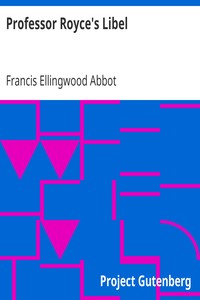Professor Royce's Libel by Francis Ellingwood Abbot
Read now or download (free!)
| Choose how to read this book | Url | Size | ||||
|---|---|---|---|---|---|---|
| Read online (web) | https://www.gutenberg.org/ebooks/19768.html.images | 127 kB | ||||
| EPUB3 (E-readers incl. Send-to-Kindle) | https://www.gutenberg.org/ebooks/19768.epub3.images | 119 kB | ||||
| EPUB (older E-readers) | https://www.gutenberg.org/ebooks/19768.epub.images | 119 kB | ||||
| EPUB (no images, older E-readers) | https://www.gutenberg.org/ebooks/19768.epub.noimages | 113 kB | ||||
| Kindle | https://www.gutenberg.org/ebooks/19768.kf8.images | 212 kB | ||||
| older Kindles | https://www.gutenberg.org/ebooks/19768.kindle.images | 200 kB | ||||
| Plain Text UTF-8 | https://www.gutenberg.org/ebooks/19768.txt.utf-8 | 118 kB | ||||
| Download HTML (zip) | https://www.gutenberg.org/cache/epub/19768/pg19768-h.zip | 115 kB | ||||
| There may be more files related to this item. | ||||||
About this eBook
| Author | Abbot, Francis Ellingwood, 1836-1903 |
|---|---|
| Title |
Professor Royce's Libel A Public Appeal for Redress to the Corporation and Overseers of Harvard University |
| Note | Reading ease score: 44.8 (College-level). Difficult to read. |
| Credits |
Produced by Curtis Weyant, Diane Monico, and the Online Distributed Proofreading Team at http://www.pgdp.net. (This file was produced from images generously made available by Case Western Reserve University Preservation Department Digital Library.) |
| Summary | "Professor Royce's Libel" by Francis Ellingwood Abbot is a philosophical treatise written in the late 19th century. This book serves as a public appeal for redress directed at the administration of Harvard University, addressing accusations made against Abbot by Assistant Professor Josiah Royce. The primary topic revolves around the principles of academic integrity, the responsibilities of educators, and the need for a fair discourse in philosophical criticism. In this work, Abbot vehemently defends his reputation against what he perceives as unjust allegations from Royce, who claimed that Abbot's philosophical ideas improperly borrowed from the idealist thinker Hegel and accused him of making exaggerated claims about his originality. Abbot meticulously refutes these claims, asserting the validity of his own philosophical stance, which he identifies as scientific realism opposed to philosophical idealism. Throughout the text, he outlines specific instances of misrepresentation in Royce's review, emphasizing the importance of honest critique and accountability within academic discourse. Ultimately, Abbot seeks not just personal vindication but also aims to uphold the honor of Harvard University and its commitment to scholarly ethics. (This is an automatically generated summary.) |
| Language | English |
| LoC Class | LD: Education: Individual institutions: United States |
| Subject | Literary ethics |
| Subject | Plagiarism |
| Category | Text |
| EBook-No. | 19768 |
| Release Date | Nov 12, 2006 |
| Copyright Status | Public domain in the USA. |
| Downloads | 143 downloads in the last 30 days. |
| Project Gutenberg eBooks are always free! | |

